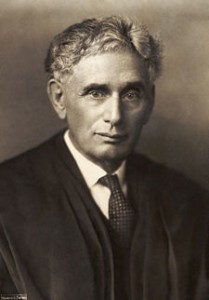 Matt Parlow has a thought-provoking new article in print: Progressive Policy-Making on the Local Level: Rethinking Traditional Notions of Federalism, 17 Temp. Pol. & Civ. Rts. L. Rev. 371 (2008). (A draft can be downloaded here.) Matt contends that the oft-quoted argument of Justice Brandeis (pictured to the left) that states may appropriately serve as laboraties for “novel social and economic experiments” applies equally well — indeed, perhaps even better — to cities and other local units of government. Citing recent immigration initiatives and living wage ordinances (including one in Madison, Wisconsin), Matt notes a long history of local-level policy innovation in this country. He argues,
Matt Parlow has a thought-provoking new article in print: Progressive Policy-Making on the Local Level: Rethinking Traditional Notions of Federalism, 17 Temp. Pol. & Civ. Rts. L. Rev. 371 (2008). (A draft can be downloaded here.) Matt contends that the oft-quoted argument of Justice Brandeis (pictured to the left) that states may appropriately serve as laboraties for “novel social and economic experiments” applies equally well — indeed, perhaps even better — to cities and other local units of government. Citing recent immigration initiatives and living wage ordinances (including one in Madison, Wisconsin), Matt notes a long history of local-level policy innovation in this country. He argues,
Because they are smaller in size, local governments are more capable of being responsive to the needs of their respective communities because they are more in touch with their constituents. This leads, in theory, to more responsive and representative policy-making as local government officials make decisions informed by the community’s wants and needs.
In light of these considerations, Matt argues against the tendency of some courts to squelch local initiatives through narrow constructions of home rule powers and liberal invocations of the implied preemption doctrine.
All of this connects nicely to the recent, lively discussion on this Blog of Milwaukee’s ballot initiative mandating paid sick leave for employees. I take it that Matt would be skeptical of arguments that the Milwaukee law is preempted by state and federal law — at the least, his analysis would suggest some good reasons why a court ought to be slow to find preemption.
Matt’s article also reminds me of the argument of Dan Kahan and Tracey Meares (which I blogged about here) that federal constitutional limitations should be relaxed so as to permit more creative responses to crime at the local level. Kahan and Meares are careful to note that their position is premised on the capacity of minority communities — which are the communities most directly affected by crime and policing — to participate effectively in local-level policymaking. Their concerns regarding the political power (or lack thereof) of affected communities might give one pause regarding recent anti-immigrant initiatives at the local level (which I do not see Matt to be embracing as a model).
For myself, I am quite sympathetic to the localist project. For instance, I have advocated for more local control over the way the war on drugs is waged (57 Vand. L. Rev. 783). Thus, I think it is unfortunate that the federal government has attempted to stamp out locally approved and regulated medical marijuana distribution operations in California. But I also think (in the spirit of Kahan & Meares) that cities that want to be more aggressive about drug enforcement — more checkpoints, drug tests, sniffer dogs, etc. — should have ample room to implement their policy preferences. (I may not want to live in such a city myself, but that is another matter.) Likewise, although I did not support the Milwaukee sick leave initiative on the merits, my preference for local autonomy and experimentation leaves me hoping that the courts will provide an opportunity for the initiative to prove its worth.
